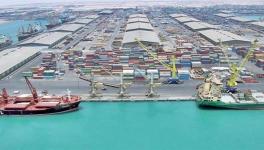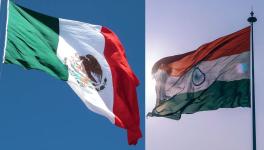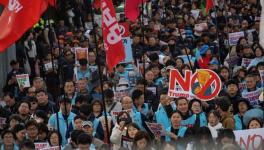America’s Saigon Moment in Afghanistan
Has the United States met its Saigon moment in Afghanistan? It is an existential question for critics who wish to discern America’s defeat in Afghanistan from strategic withdrawal. The fall of Saigon was a moment of disaster, primarily for the Americans whose hubris and hegemony got shattered, but the victory for Vietnam was pyrrhic. It opened the vistas of liberation for oppressed nations by proving the vulnerability of imperialism but wrecked Vietnam. During the imperialist war, Vietnam, Cambodia, and Laos paid an unprecedented human cost. They suffered annihilation of the necessary preconditions to build the socialism they had fought for—their material resources, including infrastructure. Henry Kissinger ordered the destruction of everything that flew to everything that moved. It was the striptease of democracy, a prelude to what the world would experience after 9/11.
When Soviets came to Afghanistan, proverbially a graveyard of the superpowers, with noble intentions of building a nation, a task assigned by history to the people and not to the external powers, they did not anticipate that their efforts to build the country would create a Salafist Frankenstein, courtesy of the United States-Pak military-mullah alliance. With no concern for the development of Afghanistan and its people, imperialism achieved two prime objectives: sending the Red Army from the war-wrecked country and the realisation of military-industrial capital through the massive consumption of ammunition. The destroyed country not only is indebted materially but faces multiple oppressive conditions inimical to its progress. Destruction invariably follows construction, but for Afghanistan, the United States had other thoughts. The United States empire found in 9/11 a god-sent opportunity to strike and destroy its former ally with full might, sending it back to the cave age, finding in it another moment of realisation of capital. Later, it proceeded to Iraq to plunder its resources. The fetish of democracy and freedom were floated and sold to the commodity-oriented world.
The two-pronged strategy was intended to maintain American domination over vast Central Asian energy resources and impede the rapidly advancing influence of China in the region. After it had destroyed and dominated the Middle East, Central Asian resources became pivotal for Western interests. To control them, having Afghanistan already in their control was an ideal situation. Afghanistan provided fertile ground to cultivate poppy, and the drug trade was always instrumental in financing the CIA’s wars against ‘subversive’ governments of ‘disobedient’ states. American historian Alfred McCoy has revealed the deep links between the drug trade and the CIA. The latter transported drugs from the Golden Triangle to the United States through Air America. From Kuomintang to Contras, the CIA has a history of supplying ammunition to its stooges by trading illicit drugs.
Whether the CIA pockets a part of the drug money seems improbable to Peter Dale Scott, a former Canadian diplomat and professor. Still, it was an indirect beneficiary and used the drug money to fight wars during the 1980s against the Soviets in Laos and Afghanistan. “The biggest source of the global drug problem,” Scott said in 2010, “is not in Kabul, but in Washington.”
In his 2009 book, Descent into Chaos: The United States and the Failure of Nation Building in Pakistan, Afghanistan and Central Asia, Ahmed Rashid writes, “Extensive opium production had first begun in Pakistan which in 1986 produced more than eight hundred tons of opium a year, or 70% of world’s heroin supply.” Later, the production was moved to southern Afghanistan, and the opium returned to Pakistan to fund the Afghan Jihad. Rashid writes, “Several high-ranking Pakistan army, air force, and ISI officials were caught trafficking heroin. In 1983, the entire ISI staff in Quetta had to be removed for dealing in opium.… the ISI used money from the drug trade to finance some of its covert operations.”
During the first Taliban rule, by 2000, poppy cultivation was wiped out, but with their fall Afghanistan became a narco-state again. In 2019, poppy cultivation and its profits peaked under American control. Multiple reports have revealed how politicians and warlords from Gulbuddin Hekmatyar to the Karzai family minted gigantic sums from drug money.
With the Taliban at the helm in Afghanistan again, will history repeat as tragedy and farce, or will objective necessity force the Taliban to behave dialectically opposite to the era of barbarism they unleashed in their first stint? The Taliban has filled the void left by the United States but is yet to gain legitimacy internationally and on the domestic front. Women and the middle class are horrified by the idea of dwelling under a medieval regime. With the IMF refusing to recognise the new government and New York Fed seizing Afghan gold, the Taliban is experiencing a Venezuela moment.
For now, the Taliban is trying to keep a religiously secular face, offering opponents amnesty, asking women to wear hijab and return to their jobs/studies, and allaying fears it will allow the export of extremist Islamist doctrines to the neighbourhood. At the same time, it intends to ban poppy cultivation, delivering a ‘shock therapy’ to the drug-dependent Afghan economy.
The Taliban is not a monolithic force, and its barbaric past makes it hard to trust them. However, in the absence of the United States and Regan’s National Endowment of Democracy, Uyghur, Xinjiang, and Chechnya will not be their priorities. As profound believers of property structure, the Taliban will be eager to join the global economy. Exploring Afghanistan’s minerals, especially lithium, will need massive resources, and energy-hunting China will be keen to provide them. It is already building a highway from Peshawar to Kabul. With the US’ departure, the Turkmenistan-Afghanistan-Pakistan-India (TAPI) gas pipeline, an American imperialist project to bypass Russia and Iran, is already eclipsed.
China and Russia seem comfortable with the latest developments in Afghanistan. Zamir Kabulov, Russian Special Presidential Envoy for Afghanistan, has revealed being in contact with the Taliban for a long time. The Russians have laid the foundations for conversations with it in advance to ensure their long-term interests.
“Moscow and Beijing,” the journalist Pepe Escobar recently wrote, “are meticulously stage-managing the Taliban’s reinsertion in geopolitics through the Shanghai Cooperation Organization (SCO), applying consensual decisions.” With the United States eclipsed and Afghanistan desperate to rebuild itself, China alone has the will and capital to bail it out from its dismal state. It is also a rare opportunity for China to halt the Taliban from gliding back to the US sphere. Afghanistan can be assimilated into the SCO and can become part of the Belt and Road project. With ties with Qatar and Turkey and room for India, the Taliban can benefit from a new alliance developing in Asia.
The days ahead are crucial for Afghanistan, and much will depend upon the future government. It matters little if the Taliban follows the Iranian model or develops its own. Only one thing is settled: a deluge and chaos are waiting for the new rulers. Consolidation of Taliban rule will only be possible through consent, not the coercion it is accustomed to. It needs to learn that the Islamic economy does not exist and god, under capitalism, is a golden calf.
The author is an Australian Pakistani writer, columnist and academic associated with Western Sydney University. The views are personal.
Get the latest reports & analysis with people's perspective on Protests, movements & deep analytical videos, discussions of the current affairs in your Telegram app. Subscribe to NewsClick's Telegram channel & get Real-Time updates on stories, as they get published on our website.
























